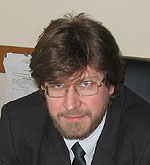 Regardless of the final results, the Ukrainian presidential
Regardless of the final results, the Ukrainian presidential
election has shown that Kiev has reached the crossroads where the
country faces an alternative of either following the Belarusian or
Russian model of development, or heading in its own direction,
towards rapprochement with the West.
Whoever wins the Ukrainian presidency the main outcome of the
election is already clear. The campaign has brought about the
creation of a new state on the European map that deserves the most
serious approach and has the right conditions to become one of the
leading powers on the continent.
Hitherto, the main protagonists of European politics treated Kiev
with neglect. Many in Moscow could barely reconcile themselves with
the fact that Ukraine was an independent state with its own
interests and development prospects.
In the West no one, despite all the rhetoric supporting a European
choice for Kiev, has ever seriously considered the scenario of
Ukraine’s integration into the Euro-Atlantic community, with
integration being seen as too complicated and time-consuming. In
any case no one knew where to start and whether it was really worth
it.
Even the description of this year’s presidential election campaign
as a battle of Russian and Western interests — and this
description prevailed in both the Russian and foreign media —
essentially implied a lack of trust in Ukraine’s own political
identity.
What has the poll shown? Firstly, it has revealed that regardless
of the problems Ukraine is facing, Ukrainian democracy is far more
developed than in other CIS member states. Nowhere over the past
few years have we witnessed such a full-blooded election fought
between equally strong and influential candidates — each with
a clear-cut political program, his own views on foreign policy and
wide public support — for a country’s top political
post.
Secondly, Ukrainian society has shown a high degree of civil
activity, making a choice determined by their true political
preferences and not by campaign tricks. Thirdly, it has revealed
their ability to resist influence from the outside, whether from
Russia or the United States. The efforts applied by both the West
and the East have barely affected the balance of forces in
Ukraine.
Finally, the apocalyptic forecasts of Ukraine’s disintegration
following the election have seen no corroboration: with such a high
electoral turnout to choose the head of the state it is highly
unlikely that those citizens want to destroy the state.
This pleasant picture doesn’t guarantee the last but most important
element — if the rival forces manage to avert mass riots and
violence, it will prove that their country is also ruled by
responsible politicians who are able to work out a compromise in
the interests of their country.
Both potential victors will be restricted in their actions. No
matter which of the two wins, the first thing on his agenda will be
to take measures to win over the opposing camp. In other words,
Yanukovich will have to go to Lviv, Yushchenko — to Donetsk.
Both will have to improve relations with key international
partners: Yanukovich — with Brussels and Washington,
Yushchenko — with Moscow.
Finally, whoever wins will have to tackle burning social and
economic problems in conditions of public turmoil and a lack of
parliamentary control. This requires exceptional political skill
and ability to reach a compromise.
Of course, a Yanukovich victory will hardly delight Ukraine’s
western partners who had threatened a considerable deterioration in
their relationship if international observers ruled the elections
were not democratic enough.
But at the same time all the European experts agree that no one is
willing to see Ukraine transformed into another Belarus, driven
into isolation. Such a scenario would be dangerous and
meaningless.
In actual fact, by seeking to convince the incumbent Leonid Kuchma
of the importance of democratic elections, Europeans have been
pushing too hard, and in doing so have deeply angered a
considerable part of Ukraine’s establishment.
But the prospects of sanctions being imposed, say, on steel
exports, will force the victorious clan to be more compliant with
the other players.
On the whole, Ukraine will continue moving towards the European
Union and NATO, though that movement will not be deliberately sped
up.
The preliminary outcome of the battle shows that Ukraine is a
complicated and subtle political system that does not deserve a
simplified approach.
I will venture to assume that Kiev, again regardless of who wins
the race, has already passed the crossroads where the country faced
an alternative of either following the Belarusian or Russian model
of development, or heading its own way towards rapprochement with
the West.










